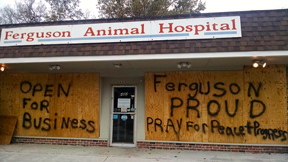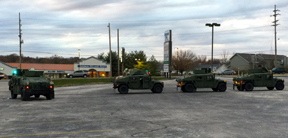
Photo by Dr. Daniel Wentz
Broken during rioting in August, the front windows of Ferguson Animal Hospital remain boarded while the owner waits for an end to the possibility of continued disturbances.
As a noisy band of vandals and looters neared, Dr. Bruce Karmazin watched through a window of his veterinary clinic until the mob came within 15 feet.
Karmazin turned to his partner, Steve Neely, and said, “I think it’s about time to load the shotguns.”
Agreed Neely, “It’s as good a time as any.”
On that night of Nov. 24, Gateway City Animal Clinic was a random target along with other businesses in and around Ferguson, Missouri, of rage against a grand jury decision not to charge a white police officer, Darren Wilson, in the fatal shooting of an unarmed 18-year-old African-American, Michael Brown.
Riots and looting that ensued destroyed or harmed a number of small businesses. Missouri Veterinary Medical Association Executive Director Richard Antweiler said no clinics were destroyed, but two closed for a time.
"The most common effect of the activity has been lost income, approaching a $10,000-to-$20,000 deficit in November for some," Antweiler said. He explained that some veterinary hospitals lost business in the days leading up to the grand jury announcement because residents, expecting the news at any time, feared going out. When Brown was shot on Aug. 9, the community experienced weeks of unrest.
Anticipation of renewed violent activity led Karmazin to take precautions at his animal clinic in the St. Louis suburb of Dellwood, across the city line from Ferguson. By keeping vigil on the property that night, business owners in the plaza prevented damage to their properties, reported Karmazin, a Caucasian man who stood guard with Neely, an African-American man.
Had they and others not been present, Karmazin said, “I am 100 percent sure that … (the property) would have been torched.”
About two weeks before the grand jury announcement, Karmazin said, business owners met with Dellwood police to discuss the city's planned response. Karmazin said police assured the business people that they were better prepared than in August, with many officers and the National Guard lined up.
Karmazin took precautionary steps of his own. His clinic had not been damaged in August, and he hoped to keep it that way. He called his business insurance carrier and confirmed that the clinic was covered for riots and looting.
Worried that the building might go up in flames, Karmazin removed all personal effects: photos, diplomas, veterinary books and artwork. In the lobby, which is behind large storefront windows vulnerable to being broken, he and staff moved a patient scale, furniture and a large glass display case. They emptied the display case, pushed it behind the reception desk and turned it so that the solid backside faced out.
Every night, he and employees removed portable items from the premises: expensive medications, equipment such as a centrifuge and microscope, and anything small enough to fit in plastic storage containers. Controlled substances they left in the large, fireproof safe that is too heavy to be carried out.
No animals were left overnight, including a 20-year old clinic cat in renal failure who had never left the clinic before.
Karmazin opted not to board up the place because he believed the appearance would scare away business and he didn't want to project a fearful environment.
The evening the decision was to be announced, the clinic closed around 4 p.m., a few hours early. Karmazin went home and turned on CNN.
During the newscast, Karmazin got a call from a friend, the wife of a police officer. She said that people were burning everything about three blocks from his clinic, and that if he wanted to save the place, he'd better go.
Karmazin called Neely and a client who owned a boutique in the plaza. He and Neely decided to bring guns. Karmazin retrieved his grandfather's 12-gauge shotgun, an heirloom that he had never used. “I hadn’t used a 12-gauge since I was in high school,” he said. He borrowed a box of shells from his next-door neighbor, a hunter.
At the clinic, the men turned on the lights and opened the blinds to make sure people could see they were there.
A restaurant in the same strip mall had just been remodeled and opened two months prior, and the owner had a bed delivered so he could sleep on-site if necessary. Karmazin felt fortunate to see 10 or 12 big men with guns in front of the restaurant to protect it. Owners of other businesses also were present and armed.
Karmazin turned on the television, and saw that the gas station down the street was engulfed in flames.
"Then we looked outside and heard gunshots everywhere, and smoke, we heard noises like a big party coming in," he recounted. About 50 people moved through the area. Karmazin heard glass break as looters worked across the street.
The parking lot of his plaza on West Florissant Avenue, a commercial area later
reported to be a center of rioting, then filled with agitators. From about 30 yards away, 10 to 15 men approached the clinic.
"I screamed at them to get the f--- out of here," Karmazin said. "Steve pulled me in and said, ‘You're going to get us killed.’ My partner kept me cool; otherwise, I would have been out there really lipping up. He said that's what stirs them up. … He pulled me in all night long."
Gunshots sounded almost nonstop throughout the night. "It sounded like a war zone," Karmazin said. "It was like being in a movie. I kept thinking, ‘This can't be happening.’ "
Five cars gathered in the middle of the parking lot, their drivers eyeballing the businesses. About every 15 minutes, one would step out of a car and walk around the strip mall.

Photo by Dr. Bruce Karmazin
The National Guard arrived at the plaza where Gateway City Animal Clinic is located early the morning after mayhem broke out. The tanks stayed there for a week.
The scene was noisy and chaotic. "It was like a big party, whooping and hollering," Karmazin said. "It was like rush-hour traffic all night long. They'd pull up to this group of five cars, and then leave. I think they finally realized there was enough presence in our plaza, and they saw that all of us had guns. I'm thankful we didn't have to use any.”
Five times, Karmazin and the other plaza tenants called 911, but police never showed.
He and Neely stayed at the clinic until 4:30 a.m. when the National Guard rolled in and the group of five suspicious cars had gone.
More than a week since the night of unrest, worries linger. Karmazin still closes his clinic an hour or so early every day, to avoid being open after dusk.
Ferguson clinic narrowly escapes burningThree miles away at the Ferguson Animal Hospital, the front windows have been boarded up since August. Dr. Daniel Wentz, the clinic owner, said the glass was broken during the first riots, and his insurance company suggested holding off on repairs until after the grand jury announcement. He’s glad he waited.
Wentz said he might remove the wooden boards next week, but then again, he may wait until a U.S. Department of Justice civil rights investigation is complete.
The night the grand jury decision was made public, Wentz stayed home, knowing the business was insured against damage. But the groomer who rents space in the clinic sat out front with friends and guns.
“It wasn’t my choice, but I believe people have the right to protect themselves,” Wentz said. “We would have been burned, too, if they hadn’t been out there,” he added, noting that buildings 100 yards from his front door were set on fire.
For days preceding the grand jury announcement, Wentz, like Karmazin, removed important equipment and materials from the clinic. He took home the computer server, controlled substances and the drug log. No animals were left overnight, including the clinic reptiles.
The most significant damage the clinic has experienced is loss of income. Wentz said out-of-town clients have been afraid to come to Ferguson; some of his reptile clients live a three-hour drive away.
Wentz, who has one part-time associate, estimates that the clinic has lost about $20,000 in gross income since early September. “By the end of this year, I will have lost about one month’s income in four months’ time,” he said.
Wentz is coping with the difficulties by focusing on the positive. He created a Facebook page,
Ferguson Proud, to emphasize the good in his community. He said most of the rioters came from elsewhere.
The shared experience has brought people in the community together. For example, Wentz has used social media to reach out to and keep in touch with colleagues such as Karmazin.
Gratified, Karmazin said, "I didn't really know Ferguson Animal Clinic before, and now we're buddies.”
Similarly, business owners in his plaza have become closer. "Before, no one really knew each other,” Karmazin said, “and now we're like best friends."
The Missouri Veterinary Medical Association is accepting donations for the affected clinics. For more information, contact 573-636-8612 or mvma@movma.org.